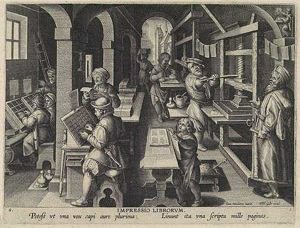In 1455 Johannes Gutenberg created with the aid of an old winepress one of most important inventions of the past 1000 years. While Gutenberg may not have known that his invention of the printing press was an “epoch making event;” (Eisenstein, 1969 p.18) that lead to the end of the Middle Ages. As Marilyn Gilmore suggests “The invention of printing with moving type brought the most radical transformation in the conditions of intellectual life in the history of Western civilization…It effects were sooner or later felt in every department of human activity.”
As Elizabeth Eisenstein argues, the printing press was an agent of change. (Eisenstein, 1979) Not only did the press allow for the shift from script to print, it revolutionized Western culture by creating an entirely new symbolic environment that would fill Renaissance Europe with new information and abstract ideas. It effected a revival of learning, which would require new skills, attitudes and a new kind of consciousness. In addition, the printing press would inspire individualism while at the same time undermining the authority of the Catholic Church. Finally, the printing press enriched a capacity for scientific and conceptual thought, as well as stressing the need for clarity, sequence and reason. All of these would move into the forefront of European society as the medieval and oral environment receded in favor of the creation of a new literate society.
The Printing Press: As An Agent of Social Change
Thomson, John
University of British Columbia (2006)
Abstract
In 1455 Johannes Gutenberg created with the aid of an old winepress one of most important inventions of the past 1000 years. While Gutenberg may not have known that his invention of the printing press was an “epoch making event;” (Eisenstein, 1969 p.18) that lead to the end of the Middle Ages. As Marilyn Gilmore suggests “The invention of printing with moving type brought the most radical transformation in the conditions of intellectual life in the history of Western civilization…It effects were sooner or later felt in every department of human activity.”
As Elizabeth Eisenstein argues, the printing press was an agent of change. (Eisenstein, 1979) Not only did the press allow for the shift from script to print, it revolutionized Western culture by creating an entirely new symbolic environment that would fill Renaissance Europe with new information and abstract ideas. It effected a revival of learning, which would require new skills, attitudes and a new kind of consciousness. In addition, the printing press would inspire individualism while at the same time undermining the authority of the Catholic Church. Finally, the printing press enriched a capacity for scientific and conceptual thought, as well as stressing the need for clarity, sequence and reason. All of these would move into the forefront of European society as the medieval and oral environment receded in favor of the creation of a new literate society.
Click here to read this article from the University of British Columbia
Subscribe to Medievalverse
Related Posts